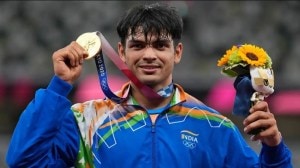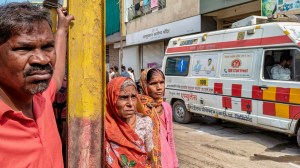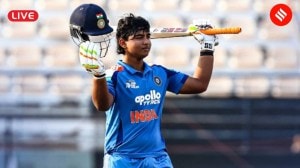Govt may close down MUHS
AUGUST 10: The Democratic Front government is considering closing down the Maharashtra University of Health Sciences MUHS, Nashik, follo...

AUGUST 10: The Democratic Front government is considering closing down the Maharashtra University of Health Sciences MUHS, Nashik, following recommendations made by a high-level review committee. The MUHS had been set up during the earlier Sena-BJP rule.
8220;We have received the review committee8217;s report on the MUHS8217; progress and are scrutinising it. Once scrutiny is done, we will take a decision,8221; Medical Education and Health Minister Digvijay Khanvilkar said.
Khanvilkar had set up a five-member committee comprising former Vice-Chancellor S S Deshmukh, noted cardiologist B K Goyal, orthopaedic surgeon S M Hardikar, former secretary Kiran Baroi and Punjab University Vice-Chancellor L S Chawla to review the progress of MUHS. The committee was asked to recommend measures for modifying MUHS8217; functions, to study and recommend how MUHS could become a catalyst of effective training and research, how it could become financially viable and also suggest measures for strengthening the administrative and academic set-up of the affiliated institutions so that they could eventually become autonomous.
In its report, the committee observed MUHS was established in a hurry without any dialogue with the concerned persons and was hence suffering from many inadequacies, particularly on the research front.
8220;The University Grants Commission has recommended the concept of autonomous colleges. The affiliating system is not favoured. MUHS could serve a useful purpose if it functions as a centre of excellence like the All India Institute of Medical Sciences, New Delhi, or Post Graduate Research Institute, Chandigarh. We must have institutions of excellence committed to training and research. We feel the most pragmatic way is to make use of existing infrastructure at MUHS and convert it into an institution of excellence for training and research,8221; the committee observed.
The committee strongly recommended that medical colleges belonging to all faculties, now affiliated to MUHS, should be reaffiliated to their original universities till such time the MUHS is adequately staffed and has a good infrastructure and proper funding to fulfil the responsibility of the affiliation and exam work.
Secondly, the committee felt MUHS should concentrate on training and research comprising basic medical research and applied research. It should also give direction for newer frontiers of medicine like genetics and molecular biology. 8220;MUHS should focus on acquiring knowledge of latest technological and medicinal improvement in all branches of medical sciences and pass it on to students, teachers and the public,8221; it said.
For the purpose, the very structure or statutes of MUHS will have to be changed rather than sticking to the old-fashioned Victorian model of traditional university rules and regulations, which gives importance to mere affiliation and exams.
On the Common Entrance Test CET and admission process for medical and para-medical courses, the committee recommended it should be handled by the Directorate of Medical Education and Research as was done earlier.
Besides visiting MUHS, the committee held six meetings and met representatives of the Indian Medical Association and a delegation of 50 noted superspecialists led by cardiovascular and thoracic surgeon K R Shetty.
8220;When the concept of affiliation and recognition has been abandoned all over the world, it was unfortunate the government set up MUHS and affiliated all medical colleges to it. We submitted reports of the D S Kothari Committee and the Rais Ahmed Committee before the review panel to press our demand,8221; Shetty said.
Launching an attack on the Sena-BJP regime, Shetty said universities like Mumbai, Pune and Nagpur have international recognition which cannot be destroyed by the misguided act of a single individual in government.
Shetty told the committee efforts should be made towards autonomy for well-established individual medical institutions for progress in medical education and excellence. 8220;If the government wants to continue MUHS, it may do so by affiliating one or two medical colleges from Nashik region as a practical solution to prevent political upheaval,8221; Shetty said.
- 01
- 02
- 03
- 04
- 05































